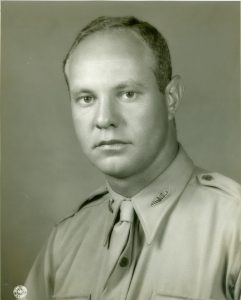
Lt. Allen Tupper Brown
This past Monday our nation celebrated Memorial Day, a national holiday that honors those men and women who have died while in service of our country. One such serviceman was Allen Tupper Brown, the stepson of General George C. Marshall.
When Allen was twelve, his mother, Katherine had invited Colonel Marshall to visit them at Fire Island during the summer. At first he told her “I don’t know about that, we are happy enough as we are.” He did change his mind and the next day he told her, “It is all right, Mother, about your asking Colonel Marshall.” Allen then proceeded to write Marshall a note in which he said, “I hope you will come to Fire Island. Don’t be nervous, it is OK with me.” He signed the note “A friend in need is a friend indeed, Allen Brown.”
And friends they were. A month after Allen married Margaret “Madge” Goodman Shedden, Marshall writes to him and provides some marital advice. “I gather that so far there have been none of the preliminary battles over tooth paste in the bathroom, the shirt on the floor, and other casual gestures common to men, about the house. If you can prevent these superficial irritations from annoying you, the remainder of the adjustments should be very simple of management.”
But neither of them made this friendship public. In her book, Together, Katherine recalls that “during Allen’s basic training, when he had been made a temporary corporal, his old Army Sergeant had asked that they bunk together. This gave Allen more privacy and later hours in which to study. The Sergeant greatly admired Marshall and had a large picture of him pinned on th e wall over his bunk. Allen, whenever he wanted to start the Sergeant fuming, would refer to his ‘Pin-Up Girl’.” Little did the Sergeant know that his roommate was the stepson of the man he admired.
In June of 1943 Marshall was invited to address Allen’s Officer Candidate School graduating class. Marshall replied, “I appreciate the courtesy of your note and proposal as well as that of General Holly and I am sorry that I cannot accept. The fact of the matter is, I had very much hoped that Allen could get through the School without his identity being disclosed, and I ask you now to see that his graduation bears no comment on his connection with me. The fact that it is known that he is my stepson denies him a good bit of the credit for earning his own way and I am distressed that it has become public.”
Marshall did not attend the commissioning ceremony but sent a letter to Allen offering him career advice, “Now that you are entering into a new status, accept my caution to organize for the long pull and do not permit yourself to be upset by irritations, misunderstandings, disappointments, and so forth, en route. These are all normal to an Army career in time of war and one must keep his head well above water and cultivate a certain philosophy along with a tenacity of purpose.”

A “Return to Sender” letter from Katherine Marshall to Allen.
Marshall also went against his policy of interfering in assignments when Allen requested that he be placed on the front lines with the Third Battalion, Thirteenth Armored Regiment, First Armored Division. “I feel quite differently about intervening in this way when it is a move to the front rather than the opposite.”
Not even a year later, on May 29, 1944 Allen was killed in action while leading his platoon in an attack west of Velletri. He was shot by a sniper when he stood up in his tank turret to observe the front with his field glasses.
Months later, Allen Tupper Brown was award the Bronze Star posthumously. Madge, his wife, wrote to Marshall to express her concern, “As you know, he never wanted any special notice paid him while he was in the Army. Do you think he would have liked a special announcement made of his decorations?” Marshall replied, “My own assumption is that he would be gratified to know that what he did and what he suffered was not ignored, in a world which only too quickly forgets the sacrifices people make to bring us comfort and enjoyment.”
